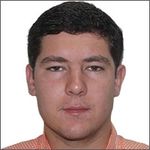The Academy's YO Committee Chair Andrea Tooley, MD, left, and Eduardo Viteri, MD, share what young ophthalmologists from around the Americas discussed during March at the 35th Pan-American Association of Ophthalmology meeting in Buenos Aires, including a mystery clinical case competition and step-by-step phaco surgery.
Young ophthalmologists from around the Americas came together in March to explore the profession’s future as well as artificial intelligence, telemedicine and data collection at the 35th Pan-American Association of Ophthalmology (PAAO) Congress in Buenos Aires.
Events Focused on YOs
PAAO holds an event every other year to give young ophthalmologists a chance to learn from their peers and discover important surgical techniques. Co-hosted with the Argentinian Council of Ophthalmology (CAO), PAAO Chair Dr. Paulo Elias C. Dantas, MD, PhD, and CAO Chair Pablo Daponte, MD, presided over the four-day event, which drew hundreds of participants from the Americas, as well as other continents.
Young ophthalmologists connected over networking events, such as tango, and in the YO lounge, discussing sustainability initiatives like EyeSustain.org, reusing surgical equipment and green architectural design to reduce carbon footprints.
They also discussed finances and entrepreneurship during their first years of practice: A case-based presentation showcased different models of practice growth, focusing on getting familiar with terms such as return on investment and return on equity to evaluate debt and projected growth.
YOs discussed their business challenges: the ups and downs of house visits, scopes, a digital ophthalmological university and best software for practices.
One symposium included young ophthalmologists’ tips to optimize their time in surgery:
- Don’t skim preparation, whether it’s learning how to do reliable preoperative measurements or getting in early into the OR with your own checklist for the day.
- Remember to take your time at the beginning of surgery on techniques, such as incisions and capsulorhexis, that condition and ease your way up into further steps of the operation.
- Focus on mastering the surgery first. During your learning curve is when it’s most important to have top quality instruments and consumables.
- Finally, practice advanced or complex steps beforehand rather than later when they are critical. For example, make a mark for toric implantation and adjust a monofocal haptics accordingly, or make it routine to perfectly center your IOLs at the end of surgery.
Mystery Clinical Case Contest
Another symposium focused on a mystery clinical case contest, during which YOs presented real cases from their diverse practices. A jury of senior ophthalmologists chose the winner: Dr. Valentina Rodriguez from Argentina presented two complex cases of Acanthamoeba infectious keratitis managed with different treatment approaches. She walked through her decision to operate when appropriate medical treatment failed and before severe complications such as corneal perforation arose. YOs were very excited about this format, and we look forward to making it a hallmark event for the future.
Lectures
Keynote speaker Roberto Zaldivar, MD, explained how artificial intelligence has allowed refractive surgeons to get better outcomes with improved formulas for intraocular lens (IOL) calculations produced with AI. He collects and uses data from his practice to enhance results for his patients.
Eduardo C. Alfonso, MD, used the Gradel Lecture to detail the benefits of virtual care. When the number of telemedicine patients skyrocketed at Bascom Palmer Eye Institute during the COVID-19 pandemic, home care devices like the home OCT or the iCare Home, a device used to monitor intraocular pressure, helped patients with their care. It also can enhance data collection, he explained.
Fernando Arevalo, MD, PhD, delivered the Moacyr E. Alvaro Pan-American Lecture, in a wonderful presentation, "Surgery for Infectious Retinitis: When Medical Therapy Is Not Sufficient." Douglas Buxton, MD, gave the Conrad Berens Inaugural Lecture, detailing Dr. Berens’ life and legacy as one of PAAO’s founders.
 About the author: Asdrubal F. Moreno, MD, is a young ophthalmologist from Caracas, Venezuela and a vitreoretinal disease and surgery fellow.
About the author: Asdrubal F. Moreno, MD, is a young ophthalmologist from Caracas, Venezuela and a vitreoretinal disease and surgery fellow.